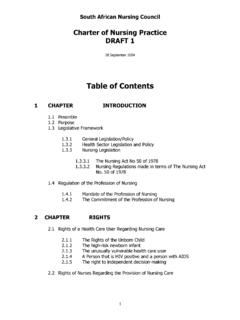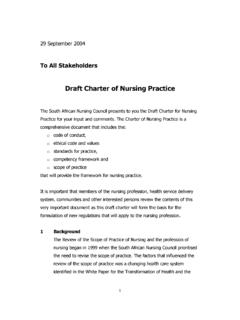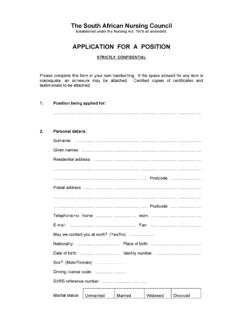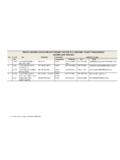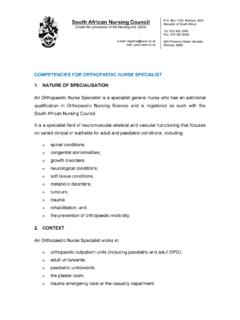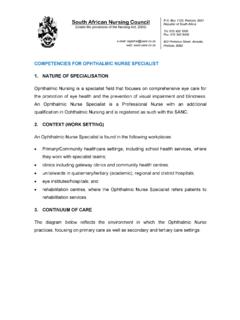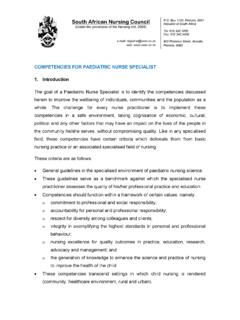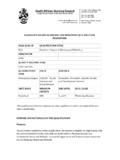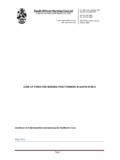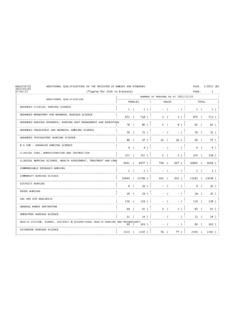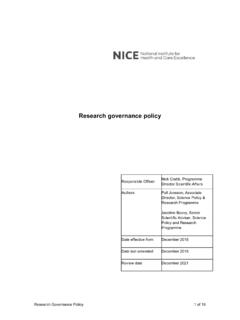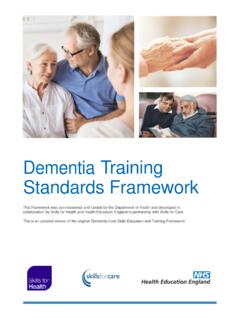Transcription of POSTGRADUATE DIPLOMA QUALIFICATION FRAMEWORK …
1 POSTGRADUATE DIPLOMA QUALIFICATION FRAMEWORK . SAQA QUAL ID QUALIFICATION TITLE. N/A POSTGRADUATE DIPLOMA . ORIGINATOR REGISTERING PROVIDER. SANC SAQA. QUALITY ASSURING BODY. SANC and CHE. QUALIFICATION FIELD SUBFIELD. TYPE. POSTGRADUATE 09 Promotive, Preventive, Curative Health and DIPLOMA Development Services ABET BAND MINIMUM CREDITS NQF LEVEL QUAL CLASS. N/A 120 8 Whole QUALIFICATION This QUALIFICATION does not replace any other QUALIFICATION and is not replaced by any other QUALIFICATION . 1. PURPOSE AND RATIONALE OF THE QUALIFICATION . Purpose The purpose of this QUALIFICATION is to strengthen and deepen the students' knowledge and expertise in nursing and midwifery as a specialty. It will enable the Nurse Specialist or Midwife Specialist to engage in their respective specialist areas of practice with in-depth knowledge, skills, attitudes and values to enhance professional independence and optimum health outcomes. This includes preventing disease, injury and complications.
2 It also entails screening, appropriate management and prompt referral of patients with specific and complex problems in all clinical settings. The programme further equips the student with facilitation of teaching and learning including management skills at all levels of practice. Rationale The South African health care system has adopted a primary health care approach which is nurse led and needs nurses with in-depth knowledge to engage at the forefront of a specialist field, discipline 1|P a g e : P O S T G R A D U A T E D I P L O M A Q U A L I F I C A T I O N F R A M E W O R K - F I N A L. DOCUMENT. or practice with an understanding of theories, methodologies, methods and techniques to apply in a particular context (Uebel et al, 2013). The health care system, again in the interest of the right to access to health, enshrined in the Constitution of South Africa (Act No. 108 of 1996), is embarking on the National Health Insurance to promote access to quality, essential health care services and access to safe effective quality and affordable essential medicines and vaccines for all.
3 This happens when there is an outcry that there is an increase in the burden of disease from the quadruple diseases including communicable diseases (predominantly HIV and AIDS and TB), non-communicable diseases (hypertension, diabetes Mellitus, Cancer), Perinatal and maternal morbidities and injury related disorders (Mayosi et al, 2009). Yet there is grave shortage of doctors who either give divided attention to the public sector for their own private practice or are specialists in the private hospitals. The Nurse Specialist or Midwife Specialist have come handy to complement the remaining medical fraternity rather than replace them. Furthermore, the NHI has necessitated focus on quality in order to ensure value for money which the knowledgeable Nurse Specialist or Midwife Specialist can drive (Makombo, 2016). While the seventeen (17) sustainable development goals promote inter-sectoral collaboration, the Nurse Specialist or Midwife Specialist are appropriately positioned to ensure healthy lives and promote the well-being for all ages through their active engagement in promotive, preventive, curative and developmental health services which are components of the primary Health Care which they lead (Addis Ababa Action Agenda, 2015).
4 2. CHARACTERISTICS OR ATTRIBUTES. The Nurse Specialist or Midwife Specialist who has completed this QUALIFICATION will demonstrate the following attributes: Autonomy: The Nurse Specialist or Midwife Specialist is able to work independently. Leader: Works the forefront in his/her area of specialist practice. Open mindedness: Is receptive to new ideas, gives a fair and impartial hearing to the intellectual opposition, willingness to take a novel viewpoint seriously. Good interpersonal skills. Scholar: Devotes self, particularly to the study of an area in which they have developed expertise and produces and utilises evidence in the area of specialisation. Negotiator: Has negotiating skills to influence and effect change. Lifelong self-directed learner: Keeping up to date and maintains competence for herself and others Advocate for professional development and optimum health outcomes. Influential: strong, powerful, visible and recognised and exercises authority where necessary.
5 2|P a g e : P O S T G R A D U A T E D I P L O M A Q U A L I F I C A T I O N F R A M E W O R K - F I N A L. DOCUMENT. Has passion for the institutional goals. Has ability to articulate ideas clearly. Trustworthy with integrity. Has positive self-esteem: engages in positive individual subjective evaluation of own worth, and has enduring personality. Has ability to listen. Emotional intelligence: Able to recognize own emotions and those of others, discern between different feelings and label them appropriately. Uses emotional information to guide thinking and behavior, and manages and/or adjust emotions to adapt to environments or achieve one's goal(s). Persistent: continues firmly or obstinately in an opinion or course of action in spite of difficulty or opposition. Critical thinker: Objectively analyses and evaluates an issue in order to form a judgement. 3. MINIMUM ADMISSION REQUIREMENTS. In order to be admitted to the POSTGRADUATE DIPLOMA programmes, a Bachelor's degree in Nursing ( ) and the DIPLOMA in Nursing: General Nurse ( ) with Advanced DIPLOMA in Midwifery ( ) must have been achieved.
6 A student can enter the programme with at least two (2) years' experience after registration as a Professional Nurse or General Nurse and Midwife. The two years include the year of community service. 4. LEARNING ASSUMED TO BE IN PLACE. Comprehensive health care Computer Literacy Bio-natural sciences Psycho-social sciences Legal, ethical and Professional practice 3|P a g e : P O S T G R A D U A T E D I P L O M A Q U A L I F I C A T I O N F R A M E W O R K - F I N A L. DOCUMENT. 5. RECOGNITION OF PRIOR LEARNING. In order for the student to access the programme through RPL, the student should submit an application to the NEI as per the Institutional policy . Only a student whose prior learning has been validated by means of a well-structured and credible Portfolio of Evidence is eligible to be awarded RPL for access. Students can also use the options of credit transfer and advanced standing for RPL in accordance with the national and institutional policies. A student who qualifies for Credit Transfer will receive a maximum of 50% of the prescribed credits of the completed QUALIFICATION , as determined by the national and institutional policies.
7 6. QUALIFICATION REQUIREMENTS. Students must have access to approved clinical facilities and other experiential learning sites where specialized nursing or midwifery services are rendered and patients with specific conditions appropriate to the field of specialization are admitted. Such clinical facilities must have been approved by the South African Nursing Council for placement. Education and management specialist students must also be exposed to relevant experiential learning sites, some of which might not require the SANC approval. 7. QUALIFICATION RULES. A QUALIFICATION shall not be awarded for early exit from a POSTGRADUATE DIPLOMA . All learning including requirements for clinical practica or other experiential learning is compulsory. The Exit level Outcomes (ELOs) applicable to the respective specialisations (clinical specialisation, Nursing Education and Health Service Management) should not be less than 80%. of the total credits. The remaining 20% is for the ELOs common to all specialisations.
8 (See Table 1 and Table 2. QUALIFICATION matrix TABLE 1: QUALIFICATION MATRIX: CLINICAL SPECIALISATIONS. Ratio of Theory to Credits of ELOs applicable to Credits of ELOs applicable to Total WIL clinical specialisations all specialisations (core). (Category/elective 1 ). Credits Credits Credits Theory =40% 38 10 48. WIL=60% 58 14 72. Total 96 24 120. 4|P a g e : P O S T G R A D U A T E D I P L O M A Q U A L I F I C A T I O N F R A M E W O R K - F I N A L. DOCUMENT. TABLE 2: QUALIFICATION MATRIX: NURSING EDUCATION & HEALTH SERVICES MANAGEMENT. Ratio of Theory Credits of ELOs applicable to Credits of ELOs applicable to Total to nursing education and health all specialisations (core). WIL services management (Category 2 and 3 or Elective 2 and 3). Credits Credits Credits Theory =58% 60 10 70. Experiential 36 14 50. Learning= 42%. Total 96 24 120. Note to table Whilst CHE (2013:20) recommends that in order to use a qualifier, at least 50% of the minimum total credits for the QUALIFICATION and at least 50% of the minimum credits at the QUALIFICATION `s exit level must be in the field of specialisation denoted by the qualifier.)
9 For the purposes of these guidelines, 80% is recommended for all specialisations. Credit-rating system rates 10 notional hours as equivalent to one credit. An academic year as defined means a period of at least 1200 (one thousand two hundred). notional hours which is equivalent to 120 (one hundred and twenty) credits. In terms of CHE (2013:15) Diplomas assume a 30-week fulltime academic year. However, the credit rating specified, is expressed as minima. Programmes may require credit loads above the minimum, but these should be realistic in terms of the relationship of credits to actual study time. The ratio of theory to WIL is 40:60 for clinical specialisations and for nursing education and health services management 58:42. The exit level outcomes applicable to all specialisations (ELOs category 1/core) must be 20% of the total credits which translates into 24 credits and distributed. 8. EXIT LEVEL OUTCOMES. Exit level outcomes applicable to all fields of study Practices and facilitates specialist nursing or midwifery, nursing education or health services management within ethical -legal parameters of the profession.
10 Applies the knowledge of and facilitates evidence-based practice, nursing education or management in the specialist field to solve contextual problems and develop policies and guidelines. Appraises and develops self, peers and nurse specialist or midwife specialist students by facilitating self-directedness or leadership and lifelong learning Facilitates advocacy for the profession and provision of specialist professional support for personnel, patients or clients, families and communities. Engages in planning, commissioning and managing a specialist unit, an educational entity or a health service. 5|P a g e : P O S T G R A D U A T E D I P L O M A Q U A L I F I C A T I O N F R A M E W O R K - F I N A L. DOCUMENT. Engages in scholarly activities to inform evidenced based practice, education or management. Utilizes, manages and communicates data to support decision-making and research. Exit level outcomes applicable to clinical specializations Renders and co-ordinates patient-centred specialist nursing or midwifery practice within a continuum of care using the scientific approach, integrating biomedical and psychosocial sciences including advanced pharmacology.
